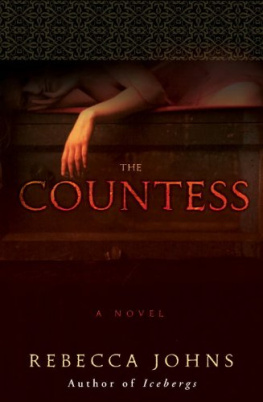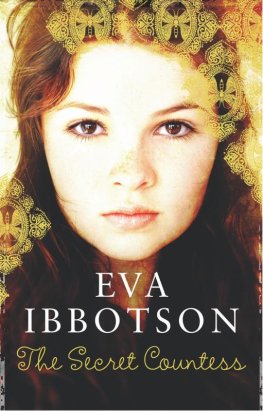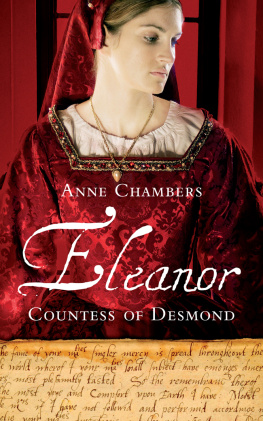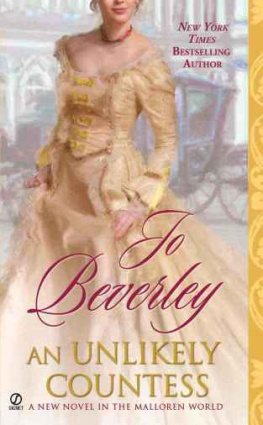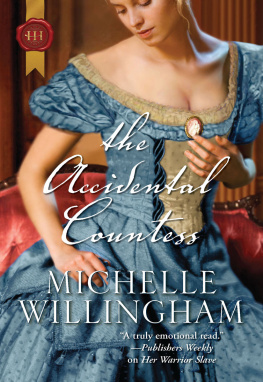Also by Rebecca Johns
ICEBERGS
This is a work of fiction. Names, characters, places, and incidents either are the product of the authors imagination or are used fictitiously. Any resemblance to actual persons, living or dead, events, or locales is entirely coincidental.
Copyright 2010 by Rebecca Johns
All rights reserved.
Published in the United States by Crown Publishers, an imprint of the Crown Publishing Group, a division of Random House, Inc., New York.
www.crownpublishing.com
CROWN and the Crown colophon are registered trademarks of Random House, Inc.
Library of Congress Cataloging-in-Publication Data
Johns, Rebecca, 1971
The countess : a novel / by Rebecca Johns.
p. cm.
1. Bthory, Erzsbet, 1560-1614Fiction. 2. CountessesFiction. 3. Women serial murderersFiction. 4. NobilityHungaryFiction. I. Title.
PS3610.O29C68 2010
813.6dc22 2010018031
eISBN: 978-0-307-58847-0
v3.1
For Brandon, my ideal reader
CONTENTS
DRAMATIS PERSONAE
In the countesss native language, the surname appears first, so she would have called herself Bthory Erzsbet. In this work the characters names are given in the order more familiar to English speakers but otherwise approximate the spelling and pronunciation the countess herself would likely have used in the late sixteenth and early seventeenth centuries. Likewise, the names of cities and towns use the Hungarian variant, including Vienna (Bcs), Prague (Prga), Bratislava (Pozsony), and Alba Iulia (Gyulafehrvr).
Pronunciation of Hungarian names puts a stronger emphasis on the vowel, as indicated by the accent mark, and softens the consonants, especially in combination: Csejthe thus is pronounced CHEY-tee, Bicske is BICH-ke, and Pozsony is po-ZHONYE. Keresztr is ker-es-TUUR and Srvr is SHAR-var, with a roll of the r. More difficult for English speakers is gy, which is pronounced with a soft dju, as in adjulation.
Erzsbet Bthory (er-ZHAY-bet BAAH-tor-ee): a wealthy noblewoman of the kingdom of Hungary Gyrgy Thurz (djuordj tuur-ZO): the palatine of Upper Hungary (16091616), the kings appointed representative to the Hungarian people, such as a prime minister Anna (AHN-nah) Bthory: the countesss mother, sister to the king of Poland Gyrgy Bthory: the countesss father Istvn (isht-VAAN) Bthory: the countesss older brother Zsofa (zho-FEE-a) Bthory: the countesss younger sister Klra (KLAAR-a) Bthory: the countesss youngest sister Ferenc Ndasdy (fer-ENTS NAA-dash-dee): the countesss husband Orsolya Kanizsay (or-SHOY-yah kan-i-ZHAY): the countesss mother-in-law Tams (tam-AASH) Ndasdy: the countesss father-in-law, palatine of Hungary from 1559 to 1562 Imre Megyery (IM-ray mejd-YER-ee): steward of Srvr and later Pl Ndasdys tutor Griseldis Bnffy: the countesss young cousin Andrs (AHN-drahsh) Kanizsay: a cousin of Ferenc Ndasdy Istvn Bocskai (BOTCH-kai): a noble companion to Ferenc Ndasdy, later prince of Transylvania and leader of the Bocskai Rebellion (16046) Rudolf II: Holy Roman Emperor (15761612) and King of Hungary (15721608) Mtys (MAH-tyash) II: Rudolfs brother, later Holy Roman Emperor (16121619) and King of Hungary (16081619) Anna Ndasdy: the countesss elder daughter Katalin (Kata) Ndasdy: the countesss younger daughter Pl (paal) Ndasdy: the countesss son Gbor (GAAH-bore) Bthory: the countesss nephew, prince of Transylvania Mikls Zrnyi (meek-LOSH ZREEN-yee): grandson of the Hungarian/Croatian war hero of the same name, married to the countesss daughter Anna Gyrgy Hommonai Drugeth (DROO-get): a wealthy nobleman married to the countesss younger daughter Katalin Erzsbet Czobor (TSO-bore): Thurzs second wife Anna Darvulia: a wisewoman and healer, a servant in the Ndasdy household Ilona J (ee-LOH-na jo): a confidential servant Dorottya Szentes (dor-OTT-tee-ya SEN-tesh), known as Dorka: a confidential servant Katalin Beneck (ben-ets-KAH): a washerwoman Erzsi Majorosn (er-ZHEE my-or-osh-NAY): the countesss healing woman Ficzk (FITS-ko): the countesss personal manservant Istk Sos (ish-TOCK sho-USH): a steward Doricza (DOR-ee-tsa): a maidservant Benedict Dese (desh-ay-OO): a steward Istvn Magyari: the Lutheran pastor of Srvr Rev. Ponikenus: the pastor of the Lutheran church at Csejthe Rev. Zacharias: the pastor of Leetice sent to hear the countesss confession during her imprisonment
One day when the queen asked her mirror: Mirror, mirror, on the wall, who in this land is fairest of all? it answered: You, my queen, are fair; it is true. But Snow-White is a thousand times fairer than you.
The queen took fright and turned yellow and green with envy. From that hour on whenever she looked at Snow-White her heart turned over inside her body, so great was her hatred for the girl. The envy and pride grew ever greater, like a weed in her heart, until she had no peace day and night.
Then she summoned a huntsman and said to him, Take Snow-White out into the woods. I never want to see her again. Kill her, and as proof that she is dead bring her lungs and her liver back to me.
The huntsman obeyed and took Snow-White into the woods. He took out his hunting knife and was about to stab it into her innocent heart when she began to cry, saying, Oh, dear huntsman, let me live. I will run into the wild woods and never come back.
Because she was so beautiful the huntsman took pity on her, and he said, Run away, you poor child. He thought, The wild animals will soon devour you anyway, but still it was as if a stone had fallen from his heart, for he would not have to kill her.
Just then a young boar came running by. He killed it, cut out its lungs and liver, and took them back to the queen as proof of Snow-Whites death. The cook had to boil them with salt, and the wicked woman ate them, supposing that she had eaten Snow-Whites lungs and liver.
T HE B ROTHERS G RIMM
22 August 1614
Csejthe, Upper Hungary
To the Reverend Eli Lni, ilina
Dominus vobiscum
It is with profound regret that I must tell you that the widow Ndasdy died last evening unrepentant and unabsolved of her crimes, despite the best efforts of myself and Rev. Ponikenus to extract her confession. At your request I have been attending that infamous lady for the past several weeks, sitting outside her door in the tower where she was a prisoner and speaking to her of the state of her immortal soul. I asked repeatedly if she felt any sorrow for the dead ones, if she knew the harm she had caused the many families that had once been under her protection, the harm she had caused her own children, but she insisted that her imprisonment was a political one engineered by the king and the palatine to steal her wealth and keep her familys influence in check. Repeatedly she contended that she had done nothing to merit the accusations against her, though she said nothing that would contradict the palatines account of her, nor explain the presence of the dead girls found in her house at Christmastime. I knew it was your wish that she might be turned at last to the consolations of Jesus Christ, and a great victory it would have been for our cause in Hungary if she had done so, but even in the last few days, when she knew her health was failing, she would not unburden herself to me and repeatedly sent me away in the middle of my prayers. Perhaps such a woman is incapable of repentance, but I cannot help but take responsibility for the failure and hope that in the future your faith in me may be better rewarded

